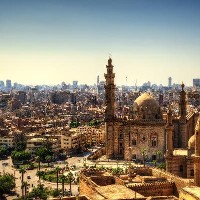
IIASA researcher Nadejda Komendantova will give a keynote speech at the International Conference of the Institute of National Planning on Digital Economy and Sustainable Development. She will present her perspective on the role that systems analysis can play in supporting the digital transformation.
 © Lukas Bischoff | Dreamstime
© Lukas Bischoff | Dreamstime
Egyptian stakeholders from the economy and sustainable development sectors will come together on 3-4 April 2021 for the International Conference of the Institute of National Planning of Egypt (INP) to discuss global and regional experiences to enhance the roles of the digital economy in support of sustainable development.
Speakers will include the Egyptian Ministers of Planning, Communications and Information Technology, as well as experts and researchers from the economics and environment sectors from across the country.
The goal of this virtual conference is to bring together international experts and regional experts from Egyptian agencies concerned with the issues of digital economy and sustainability to share views and best practices. Experts will discuss local and global experiences and introduce ideas for alternatives, future priorities and policies to develop the roles of the digital economy in Egypt to support sustainable development.
As part of the session welcoming internationals, Nadejda Komendantova will be presenting her work on how systems thinking can help leverage the opportunities and address the challenges of digital transformation to inform future policies in digital ecosystems.
IIASA and Egypt
Since 2010, research collaborations between IIASA and Egypt have involved twelve Egyptian organizations and led to 24 scientific publications in areas ranging from demography to renewable energy. Joint studies focus on the complex global systems that affect Egypt, its economy, environment, and people. Research topics include analyzing the challenges and opportunities of developing large-scale renewable energy infrastructure in Egypt and the surrounding region, modeling food production and water flow in the Nile Basin, and projecting Egypt’s future population.
